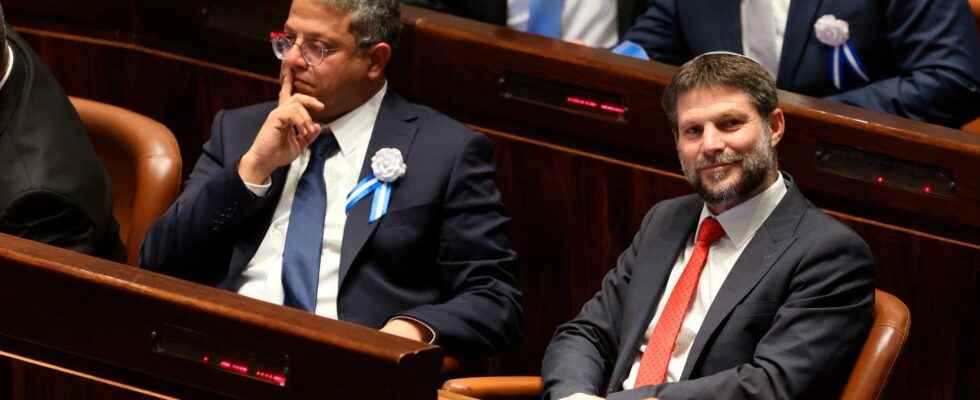Published: Just now
1 of 3 Photo: Abir Sultan/AP/TT
Israel’s new government is expected to be more religious and nationalist than ever. Benjamin Netanyahu’s government raises concerns in the outside world about an escalation in the West Bank.
– These are very extreme politicians, says Israel expert Anders Persson.
After extensive negotiations and far-reaching concessions on the part of 73-year-old Netanyahu, both in terms of policy and ministerial posts, Israel’s new government is sworn in on Thursday. The coalition is based on cooperation with people and parties with whom Netanyahu still has good enough relations after letting many down during his previous terms as prime minister.
The far-right government takes office after a year that has been the most violent in the West Bank in almost 20 years, according to Anders Persson, political scientist and Middle East researcher at Linnaeus University. A key question is how the new government will deal with the violence.
– All indicators point in the wrong direction – towards the West Bank moving towards further instability. And now extreme politicians get key positions within the government with a very large influence on the situation in the West Bank, he says.
Wants to deport Arabs
Above all, it applies to Itamar Ben-Gvir, incoming minister for national security, as well as Bezalel Smotrich, who becomes finance minister and also gains control over the occupying power in the West Bank. The hard-line politicians in the incoming government have raised concerns about increased tensions and a military escalation in the West Bank.
– The extremists are more and worse and much more centrally located in the government than before. There is no end to historical racist statements from both Smotrich and Ben-Gvir – so there are major concerns in a number of areas, says Anders Persson.
Over the years, Smotrich and his radical blockmates have, among other things, advocated a total annexation of the West Bank, expulsion of “disloyal Arabs” and that Israeli soldiers should be allowed to shoot Palestinians who throw stones. Both Smotrich and Ben-Gvir are also outspoken against the rights of LGBTQI people.
Expanded settlements?
Several of Netanyahu’s key allies in the new government, including most in Smotrich’s Religious Zionism party, are ultra-nationalist settlers who want to see an expansion of Jewish settlements in the West Bank. Around 500,000 Israeli settlers share territory with around 2.5 million Palestinians in the West Bank – settlements that most of the world’s countries consider illegal.
The US, traditionally one of Israel’s strongest allies, has already warned the new government against “actions that undermine the possibility of a two-state solution”. But in the coalition agreement made public on Wednesday, expanded settlements were at the top of the priority list. According to the agreement, a number of illegal settlements are to be legalized and occupied land is to be annexed. Anders Persson is concerned.
– It is wise to judge politicians by what they do instead of what they say. Much remains to be seen, he says and continues:
“Witch Brew”
How much influence the most extreme get politically is still unclear, says Anders Persson.
– The concerns are clear and real. That doesn’t mean they come true, but it is a potential crossroads for Israel.
At the same time, Palestinian support for violence against Israel is higher than in many years. 72 percent of Palestinians want to see more armed groups fighting Israel in the West Bank, according to a poll by the Palestinian PCPSR. Anders Persson fears an increasingly escalated conflict.
– If you combine the high level of violence with the Palestinian support for armed resistance, plus the new Israeli government with strong extreme elements, you have a witch’s brew.
Facts
Israel’s politics
The Israeli parliament, the Knesset, consists of a chamber of 120 members elected every four years. But the prime minister can call new elections at any time, something that happens often. The country has gone to elections five times in less than four years.
Israel is usually governed by coalition governments. Since the barrier to parliament was long at 2 percent (which in 2014 was raised to 3.25 percent), it is common for alliances of small parties that want to get into the knesset.
The November 2022 election was called after Naftali Bennett, who was prime minister at the time, declared in June that the fractured eight-party coalition that came together the year before to wrest power from then-prime minister Benjamin Netanyahu’s coalition was no longer sustainable.
Along with supporting parties, 73-year-old Netanyahu’s right-wing Likud party subsequently achieved a clear majority in the November 1 election. Since then, Likud has entered into coalition agreements with several parties on the extreme right of the political scale. The government sworn in on Thursday is made up of a mix of ultra-Orthodox parties, Netanyahu’s Likud party and an ultra-nationalist religious faction led by Itamar Ben-Gvir.
Netanyahu was Israel’s prime minister from 1996 to 1999 and then from 2009 until he was deposed in 2021. His leadership is a watershed in Israel – not least as the Likud leader now comes to power amid an ongoing trial, where he is accused of corruption despite his denial.
Read more
